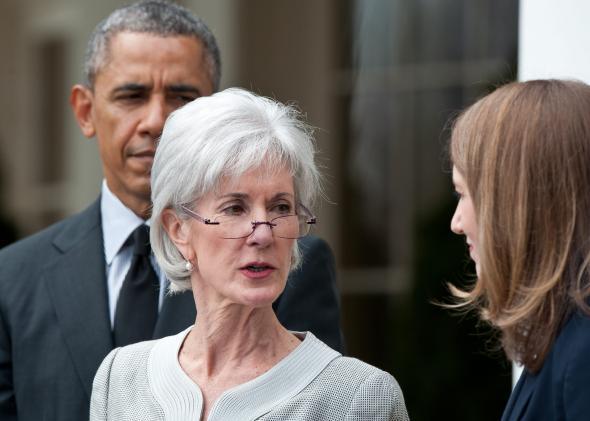Kathleen Sebelius, the outgoing health and human services secretary, has one last job she can do for President Obama. She can allow Republicans to heap criticism upon her as she heads out the door. The more she is seen as the agent of Obamacare’s woes, the embodiment of the bad website and the law’s generally snakebit nature, the better it is for the political health of the president’s signature program. As if to fulfill this promise, when Sebelius read her prepared remarks announcing her departure on Friday at the White House, she flipped through her pages and admitted, “Unfortunately, a page is missing.”
Now that more than 7.5 million Americans have signed up through the health care exchanges, it was only a matter of time before Sebelius left her post. Regardless of her blameworthiness for the website’s poor rollout or the credit she deserves for meeting that crucial enrollment goal, she is the face of the initial disaster. There’s no way that the administration and Democrats running for re-election could say the program is flying straight when the most high-profile official from that dark period is still on the job, appearing on television and in the newspapers. (You can’t turn the page when “unfortunately, a page is missing.”)
Reaching the once unthinkable enrollment target allows for a reconfiguration without it looking so much like a retreat. Many Washington analysts thought Sebelius would be out sooner. The president’s critics and opponents demanded it. Though there was talk inside the administration about firing Sebelius, there was a lot to argue against it. Obama is temperamentally not one for symbolic firings, particularly to please his opponents or the pundits. Plus, slipping Sebelius a pink slip wouldn’t have improved the management of the website rescue effort. The president did that by putting a new management team in place through the so-called tech surge. What leaving Sebelius in the post did do was allow her to work on what she was good at—pushing governors to stick with the federal exchanges and pushing national sign-up efforts—while serving as a buffer to the attacks leveled by Republicans and political pundits. When an explanation was needed, the administration could push Sebelius out front for media appearances or another round of congressional abuse.
Democrats have long prayed that Republicans will overplay their hand by attacking the website failure so much that they teach people to associate the health of the site with the health of the underlying plan. So too with Sebelius. If she could draw all the poison, then her departure would help the administration pretend the problems had been banished.
The good enrollment numbers help Democrats extol Obamacare’s progress, and a new face at the head of the effort helps lock in the idea that the law is no longer in recovery but here to stay. Obama named Office of Management and Budget director Sylvia Mathews Burwell as Sebelius’ replacement, focusing on her effectiveness. “I could choose no manager more experienced, more competent,” said Obama at the White House on Friday. In the New York Times, the president’s chief of staff Denis McDonough said, “The president wants to make sure we have a proven manager and relentless implementer in the job over there, which is why he is going to nominate Sylvia.”
The president never mentioned management skill in 2009 when he announced that Sebelius was heading HHS. She was heralded for her bipartisan deal-making skills and her knowledge of what people wanted from the health care system. Now management is job No. 1.
The focus on management isn’t just about public relations. In the next year, Burwell will have to manage the next enrollment period, finesse the insurance companies as they respond to the first round of enrollment with new premium prices, and generally act as the administration’s first responder as the law intersects with the existing health care market.
The Burwell pick helps settle heartburn for congressional Democrats. They no longer have to defend Sebelius, and they can have more confidence that when the law faces inevitable challenges, Burwell’s management skill will help avoid another political nightmare. Burwell enjoys the complexities and substance of policy and has worked hard to keep in touch with members of both parties in Congress as director of OMB. A veteran of the Clinton administration, as well as the private sector, she has Washington bonafides but also skills from working outside the government bureaucracy.
Though this is the next stage in the White House page-turning exercise, the pages are never going to get so turned that Democrats in tight races can use the Affordable Care Act as a political weapon. Burwell can manage future bumps so that Democrats aren’t surprised in the middle of their campaigns, but the best they are going to be able to hope for is that the Obamacare issue isn’t on the front pages. Less time will be spent responding to the latest Obamacare challenge, which leaves more time to talk about the minimum wage, equal pay, or whatever local issue they hope to use to define their opponent.
That might not be enough. The problem for Democrats still remains that the people who most passionately dislike the Affordable Care Act are Republicans, and they say they are more likely to vote in November than Democrats do. In the latest NPR national poll, Republicans were 7 percentage points more likely than Democrats to say they are certain to vote this November. And those voters are angry about the law’s intrusiveness, its possible collateral damage to the care they already receive, and a host of other issues that can’t be mitigated through improved enrollment numbers. Those are all problems that even Secretary Sebelius can’t be blamed for.
